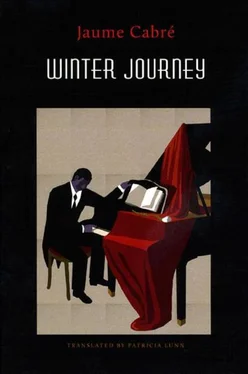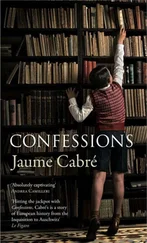Shadows, darkness, stairs that went unbelievably far down, and, after a few turns, the distinctive smell of diamonds that only he was able to detect.
"1 wonder if…" He shook his head, serious. "No, never mind, let it be."
(My love, what is it that you don't dare tell me? That you love another? That you're married?)
"No, what is it? I'm willing to…"
"Well, I was wondering if… if you'd like me to kiss you."
(The Lord be praised.)
"You're sure? Do you mean that…?"
"Yes, you're right, Sarah. Forgive my boldness."
"No, I mean…"
(Oh, yes, my love. Kiss me once and I'll kiss you a hundred times and feed off your indestructible love and you and I will live forever in a paradise where the rivers and streams run with milk and honey.)
"The facets of your eyes are very well cut, my love." He brought the light close to her. "And when the light shines on them, they sparkle as if they were jewels. I love you, Sarah."
Sarah, in response, stood on tiptoes and covered his mouth with a kiss inappropriate to her age but very exciting to Baruch. A thousand days later she let go of her Josef, and he told her, I've made a mistake: to compare your eyes with simple diamonds is to do them an injustice.
"I like your eyes too, Josef Cohn. And your hands."
"Where does your father keep the diamonds?"
"In a secret place. Why?"
"To compare them in front of a mirror. Next to your eyes, a diamond loses all its value."
"Do you really think my eyes are so pretty?"
"They're the most beautiful light I've ever dreamed of. You know, a diamond needs the sun to coax out the fire it has inside. But your eyes…" In tears, Baruch confessed, "1 didn't know there could be such beauty in the world."
Sarah, trembling, pushed aside the work table while Baruch held up the light at a prudent distance. Behind a tattered curtain hung from the wall, a cavity closed off by a solid wood door.
"The key isn't here. They usually keep it here but…"
Baruch brought the light close. It was a Larszoon lock.
"Too bad," he said out loud. When your father or your noble brother Chaim have returned, we'll ask them to let us try it.
When the happy and the careless were sound asleep and the house itself was resting, Baruch took the key from behind the stove, went into the depths of the workshop and stood before the Larszoon lock with a skeleton key and his stiletto. He opened the lock before the candle had burned down one finger-width. The door opened onto a storage space cut into the wall. To the side, some little boxes on shelves. He brought the candle up to them and the jewels and the diamonds multiplied in explosions of joy, like Baruch's eyes. He looked hard at one of the boxes. He brought the candle up to it and said in a low voice Those sons of bitches holy ltshak and his milksop son. Crystals that smelled of glass. Glass! A cheap copy that… Then he saw that there were more boxes behind, and he took a step inside with the candle. Behind him a soft sound, a little current of air, enough to blow out his candle. The door had closed and someone was working the Larszoon lock with a key and sealing the tomb of Baruch Benedictus Gerrit Peter Josef Anslo Olson van Loo Nielsen Cohn.
"You can eat your lies," he heard, muffled, from the other side of the heavy door, before he fainted from terror.
Gottfried Heinrich's Dream
It is music: it has come from a heart.
J.S.B.

 t four in the afternoon the old man sat up in bed and said, Kaspar, son, where are you? B-flat, A, D-flat, B, C.The phrase had returned suddenly to his memory. Hearing how poor Gottfried played the clavier had always made him sad, very sad. He remembered Gottfried's gray eyes, open as if they wanted to flee from behind the notes strung together by his long, nervous hands. He imagined his unruly heart, which made him look at women with an anguish that more than once had made the old man tremble. And, especially, the disordered thoughts that forced him to live in constant mental chaos.
t four in the afternoon the old man sat up in bed and said, Kaspar, son, where are you? B-flat, A, D-flat, B, C.The phrase had returned suddenly to his memory. Hearing how poor Gottfried played the clavier had always made him sad, very sad. He remembered Gottfried's gray eyes, open as if they wanted to flee from behind the notes strung together by his long, nervous hands. He imagined his unruly heart, which made him look at women with an anguish that more than once had made the old man tremble. And, especially, the disordered thoughts that forced him to live in constant mental chaos.
These things had made them both cry, he and his faithful Magdalena, when Dr. Miithel told them that Gottfried Heinrich wasn't all there; he would grow like other children, but they should expect no mental effort from him because he had no thoughts. Nevertheless, one day hope appeared, like a ray of bright light. They could see that the doctor was quite wrong: Gottfried did think. But it seemed that he thought with his heart and not his head. It was a cold day and very snowy, a day when his father was particularly tired on the way home from the Tomasschule, ready to blow up the entire Ineptitude Brigade en bloc. As he was walking the short distance to the house, he heard a strange stammering from the clavier and he found Gottfried seated, at the age of seven, imitating his posture, leaning over the keyboard, his eyes vacant, playing a not very transparent version of Contrapunctum VIII, which he had been working on at the time, the child bent over the sounds, sweating, so transported that he wasn't even aware of his father's presence. No one had taught Gottfried the art of the keyboard, because nothing can be taught to a child without thought. His father, standing, silent, his wig in his hand and his mouth open, saw that his beloved Gottfried had thought, memory and will, because if he was able to reproduce something so difficult, he could think, remember and apply himself, God be praised. And the master wondered which school he should take him to the very next day. But, after several attempts, the complete failure of this initiative forced them to the bleak conclusion that Gottfried had thought, memory and will only for music; for everything else he was still what Dr. Miithel had told them: an idiot. And he always would be. But after the day of the Contrapunctum, Gottfried had his father's express permission to play the clavier, like all of his brothers and sisters. They often listened in silence, the older ones respectfully and the younger ones somewhat fearfully, to the wild improvisations that could go on for a long time bringing tears to Magdalena's eyes as she prayed silently and said, My poor son, my poor son, he has thoughts only for strange music.
On February 26, when they were celebrating Gottfried's sixteenth birthday, all of the siblings who were present asked him to improvise, and as he always did before he put his hands on an instrument, he raised his eyes and looked beseechingly at his father, his mouth open, showing, without realizing it, the hole where his tooth had been broken in a brawl two years ago in the lane that vomited mud and sewer water into the Pleisse, requesting a dispensation that his feeble head could not understand had been granted him forever. And the father had to nod his head so that blessed Gottfried could play with a tranquil spirit. The old man remembered that that day was especially difficult because Gottfried started out with an unusual theme, B-flat, A, D-flat, B, C, which raised protests from his siblings, which he silenced to see where it would go. Everyone understood that Gottfried's improvisations on this theme would lead him straight to hell. But out of pity for the emptiness in his head, they let him play for much of the afternoon, until Elizabeth, dear Liza, to distract him from that diabolical music, suggested that they go throw snowballs in Saint Thomas's square. B-flat, A, D-flat, B, C: a kind of phantasmagorical and unseemly version of the familiar theme, which took the form of BADESHC. Which meant nothing to anyone, except that in some strange and ancient language Badeshc was the occult name for Satan.
Читать дальше


 t four in the afternoon the old man sat up in bed and said, Kaspar, son, where are you? B-flat, A, D-flat, B, C.The phrase had returned suddenly to his memory. Hearing how poor Gottfried played the clavier had always made him sad, very sad. He remembered Gottfried's gray eyes, open as if they wanted to flee from behind the notes strung together by his long, nervous hands. He imagined his unruly heart, which made him look at women with an anguish that more than once had made the old man tremble. And, especially, the disordered thoughts that forced him to live in constant mental chaos.
t four in the afternoon the old man sat up in bed and said, Kaspar, son, where are you? B-flat, A, D-flat, B, C.The phrase had returned suddenly to his memory. Hearing how poor Gottfried played the clavier had always made him sad, very sad. He remembered Gottfried's gray eyes, open as if they wanted to flee from behind the notes strung together by his long, nervous hands. He imagined his unruly heart, which made him look at women with an anguish that more than once had made the old man tremble. And, especially, the disordered thoughts that forced him to live in constant mental chaos.










